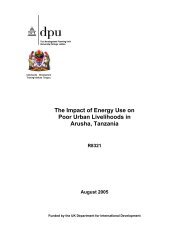EPA Review Annex Documents - DFID
EPA Review Annex Documents - DFID
EPA Review Annex Documents - DFID
You also want an ePaper? Increase the reach of your titles
YUMPU automatically turns print PDFs into web optimized ePapers that Google loves.
development assistance in the <strong>EPA</strong>. However, negotiating temporary movement of labour<br />
has been such a sensitive issue for the EU politically. It is not surprising there was little<br />
progress in the <strong>EPA</strong> negotiations.<br />
With only two countries in the region, Fiji and Papua New Guinea have signed interim <strong>EPA</strong><br />
with the EU, mainly due to the concerns of their tuna and canned tuna exports and Fiji sugar<br />
export to the EU. Given the nature of small islands countries with similar factors<br />
endowments, it would be better to use resources in other areas than in promoting regional<br />
integration.<br />
4. Conclusion<br />
The <strong>EPA</strong> process clearly exposed the weak regional cohesion in most <strong>EPA</strong> regions in which<br />
diverging national interests often prevailed over regional agenda, lack of political<br />
commitment to find the compromise over their differences. It is fair to say that many ACP<br />
countries engaged in <strong>EPA</strong> negotiations with reluctant and with prime objective of maintaining<br />
their preferential market access to the EU while making the least possible commitments in<br />
terms of opening up of their own markets. The study edited by Bilal and Stevens (2009)<br />
reports that interim agreements with Ghana, Cote d’Ivoire and Cameroon have been agreed<br />
on the basis of draft texts proposed by the Commission at the last minute; and some interim<br />
agreements have not been seen nor checked by the ACP technical experts and were agreed<br />
on only at political level. However, many ACP countries should shoulder their share of<br />
responsibilities, the 2007 deadline was well known for years and during this period, leading<br />
up to it many African countries did not seem to prepare their market access offers.<br />
In their current form, most interim <strong>EPA</strong>s will do little to advance regional trade integration in<br />
Africa with possibly one exception of the EAC. The EAC entered interim agreement as a<br />
custom union and agreed on a common schedule of imports liberalisation from the EU. This<br />
facilitated the liberalisation of intra-EAC trade in the same products. Bypassing the formal<br />
regional negotiation structures was potentially weakening the regional solidarity. The<br />
fragmentation of countries has led to tensions within the regions and put non-LDCs in a<br />
difficult situation, the choice seemed to be entering the bilateral interim agreement with the<br />
EU individually disrupting the regional integration, a political costly option; or aligning with<br />
the region and fall back to GSP, an economically costly option for the countries concerned.<br />
Inevitably, some countries have favoured national interests over those of the region, as they<br />
did not see the need to find regional compromise on their exclusion basket. Notably, this is<br />
the case of many ESA signatories which are not yet integrated. Therefore, it is safe to say<br />
that all others interim <strong>EPA</strong>s have not reinforced regional integration efforts in Africa.<br />
Conducting interim agreements bilaterally provides the opportunity to safeguard market<br />
access for the countries where the regional solutions were not possible in the short-pressed<br />
time. The bilateral approach adopted by the EU and some ACP counterparts seem at odds<br />
with the objective of <strong>EPA</strong> to enhance regional integration. To address the problem caused by<br />
bilateral interim agreements, the 2008 negotiations have been conducted at the regional<br />
level and all regions seemed to show good will to harmonise trade regimes toward the EU at<br />
the regional level. However, different starting positions and interests among members with<br />
regional groupings remain.<br />
All in all, four points are apparent. First, any international agreement or treaty could<br />
potentially have effects of lock-in and enhancing credibility of reforms, in this sense, the <strong>EPA</strong><br />
is no exception. The question is whether the <strong>EPA</strong> adds more extras in terms of incentives,<br />
mechanisms to enhance regional integration. The <strong>EPA</strong> could help accelerate regional trade<br />
integration by supporting trade facilitation and capacity building for making and implementing<br />
open trade policies and by financing the development of regional infrastructure. However,<br />
the institutions and rules are not the only problems and may not be the immediate challenge<br />
to boosting African trade and intra-African trade. The European model, institution-led<br />
224
















